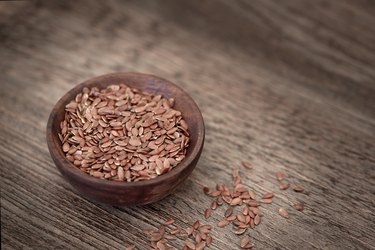
In recent years, flaxseed, one of the world's oldest and most versatile crops, has emerged as a nutritional powerhouse. This tiny, nutty seed is not only a good source of fiber, but one of the richest plant sources of omega-3 fats, and abundant in lignans — an estrogen-like compound or phytoestrogen.
While human estrogen is vital for the growth and regulation of the female reproductive system, excessive exposure to this hormone is linked to certain health conditions, including breast cancer.
Video of the Day
Video of the Day
This has prompted concern that the estrogen effects of flax may impact blood levels, however research to date shows that adding flaxseed to the diet either reduces, or has no significant impact on body levels of estrogen.
Flax Nutrition
Consuming flaxseed can help manage and reduce the risk of conditions such as heart disease, diabetes and cancer. These health benefits are commonly linked to the seed's fiber, lignan and omega-3 fat content, although not all plant chemicals in flax have been directly studied.
In the research world, flax is probably most well known for its lignan content, as this seed contains up to 800 times more of this phytoestrogen compared to other plant foods.
A controversial issue, however, has been the estrogen-like effects of lignans, and concern that flax consumption may fuel disorders linked to excess estrogen, including estrogen-receptive breast, uterine and ovarian cancers.
Flax Impact on Estrogen
Although phytoestrogens — such as lignans — are structurally similar to the estrogen made by the body, eating more flax does not appear to increase blood levels of this hormone.
In fact, a review of available human research, published in the May 2014 issue of "Integrative Cancer Therapies," concluded flaxseed consumption either had no impact, or caused a decrease in blood levels of estrogen.
Additionally, one of these trials showed 2 tablespoons of ground flaxseed daily reduced levels in people who have overweight, but did not significantly decrease estrogen levels in people with normal weights after menopause.
Beyond Estrogen Levels
Phytoestrogens do not need to reduce estrogen levels in order to exert their health effects. For example, lignan byproducts are known to bind to the estrogen receptors found in body tissues, shifting estrogen production to weaker forms which do not enhance cancer cell growth. The lignans found in flax may also inhibit aromatase, an enzyme which produces estrogen.
Because phytoestrogens are structurally similar to estrogen, they can also mimic estrogen and help reduce the risk of conditions associated with low estrogen levels, such as osteoporosis and heart disease. However, more research is needed to determine the effectiveness, dosing and safety of using flax as a therapy for conditions associated with low or high estrogen levels.
Precautions
If you choose to add flaxseed to your diet, ground seeds are preferred, as they allow better absorption of the omega-3 fats and the lignans. Most people start with 1 tablespoon a day, mixing it in oatmeal, yogurt, salads or cooked grains. Flaxseed oil does not contain lignans and fiber, unless these are added.
If you are being treated for a health condition or take prescription medications and wish to add any supplement to your diet, or if you are concerned about your estrogen levels, talk with your doctor. Also speak with your doctor if you are pregnant or breastfeeding and want to supplement with flax, or if you want to use flax in your child, as research is not available on these populations.
Reviewed by Kay Peck, MPH RD
- Today's Dietitian: The Role of Flax in the Diet — Learn About Its Nutritional Content and Potential to Help Prevent and Manage Various Medical Conditions
- The American Journal of Clinical Nutrition: Supplementation With Flaxseed Alters Estrogen Metabolism in Postmenopausal Women to a Greater Extent Than Does Supplementation With an Equal Amount of Soy
- Nutrition and Cancer: Effect of Dietary Flaxseed on Serum Levels of Estrogens and Androgens in Postmenopausal Women
- Journal of Food Science and Technology: Flax and Flaxseed Oil: An Ancient Medicine & Modern Functional Food
- AICR In Depth: Flaxseed and Breast Cancer
- British Journal of Pharmacology: The Potential Health Effects of Dietary Phytoestrogens
Is this an emergency? If you are experiencing serious medical symptoms, please see the National Library of Medicine’s list of signs you need emergency medical attention or call 911.